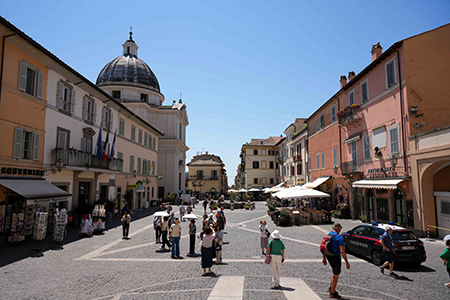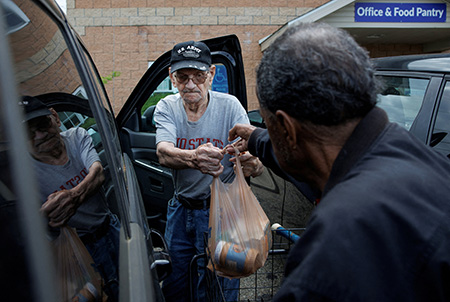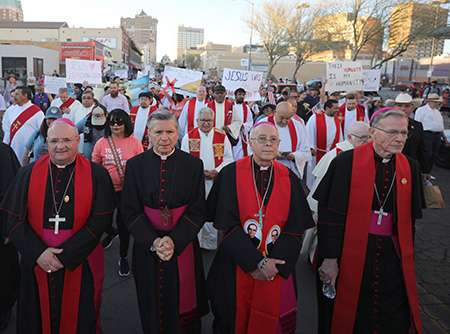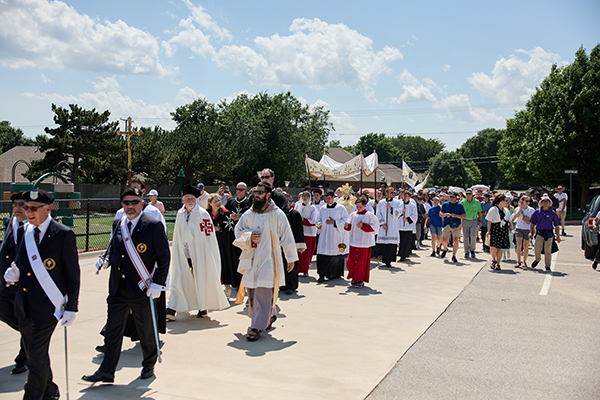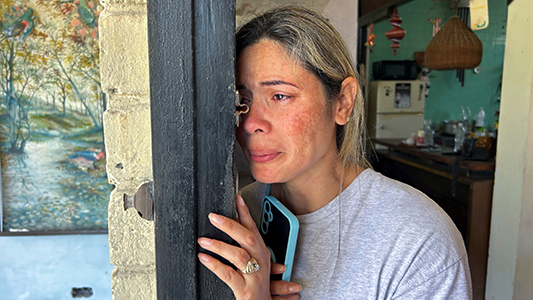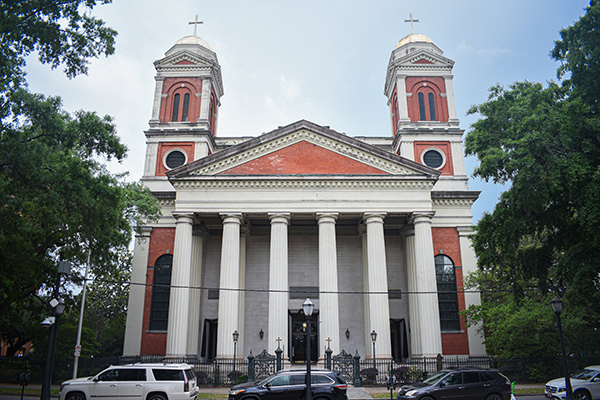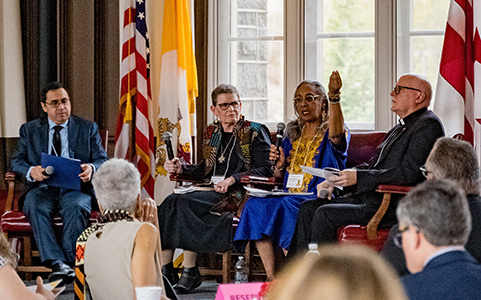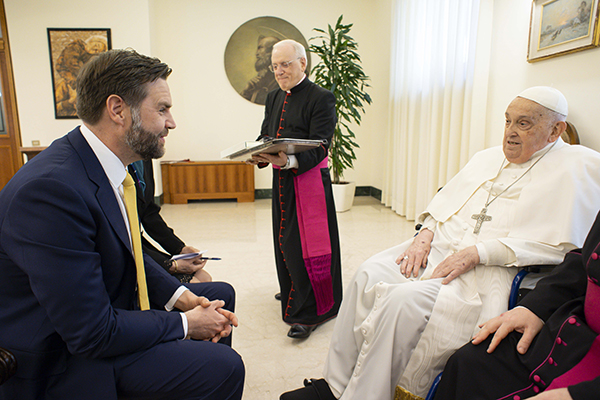By Kate Scanlon
WASHINGTON (OSV News) – President Donald Trump on July 4 signed a reconciliation bill enacting much of his legislative agenda on taxes and immigration during an Independence Day ceremony at the White House.
“Our country has had so much to celebrate this Independence Day as we enter our 249th year. America’s winning, winning, winning like never before,” Trump said in comments at the ceremony.
“We have officially made the Trump tax cuts permanent,” he added. “That’s the largest tax cut in the history of our country. … After this kicks in, our country is going to be a rocket ship, economically.”
Previously, the U.S. House on July 3 approved the One Big Beautiful Bill Act in a 218-214 vote.
The Senate earlier approved the reconciliation package on July 1, after Trump urged them to do so by July 4.
Catholic leaders have alternately praised and criticized various provisions in the legislation. But in a July 1 action alert emailed to its supporters, the U.S. Conference of Catholic Bishops ultimately said the bill “currently fails the poorest families.”
Only two Republicans – Reps. Thomas Massie, Ky., and Brian Fitzpatrick, Pa., – voted against the measure. Massie cited the bill’s projected increase to the national debt, while Fitzpatrick, who is Catholic, cited the way Medicaid cuts would impact his district.
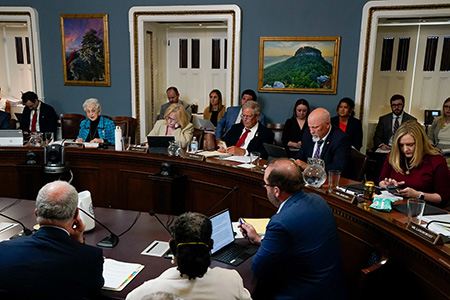
Archbishop Timothy P. Broglio, USCCB president and head of the U.S. Archdiocese for the Military Services, said in a July 3 statement after the vote, that he and the bishops had “repeatedly and consistently” urged lawmakers to make sure the bill would help families in need and “to change course” on aspects “that fail the poor and vulnerable.”
“The final version of the bill includes unconscionable cuts to healthcare and food assistance, tax cuts that increase inequality, immigration provisions that harm families and children, and cuts to programs that protect God’s creation,” Archbishop Broglio said. “The bill, as passed, will cause the greatest harm to those who are especially vulnerable in our society. As its provisions go into effect, people will lose access to healthcare and struggle to buy groceries, family members will be separated, and vulnerable communities will be less prepared to cope with environmental impacts of pollution and extreme weather.”
The USCCB president said, “More must be done to prevent these devastating effects.” He noted the church’s own teaching on human dignity and the common good compels it “to redouble our efforts and offer concrete help to those who will be in greater need and continue to advocate for legislative efforts that will provide better possibilities in the future for those in need.”
House Speaker Mike Johnson, R-La., said at a press conference following the vote, that Republicans “did not want to waste that opportunity” of having control of both chambers of Congress and the White House to enact Trump’s agenda.
“A lot of the estimations about what this legislation would do in a negative manner to communities in my state or any other are far overblown,” Johnson said when asked about criticism of the bill from faith groups in his state. “I can tell you that this bill is going to be a great thing for everybody around the country, my constituents, especially. What’s good for Louisiana is good for America.”
During his eight hour and 44 minute floor speech – part of a House procedure known as the “magic minute” where members in leadership can speak for as long as they please during “one minute” speeches without subtracting the extra time from the debate, House Minority Leader Hakeem Jeffries, D-N.Y said, “I rise today in strong opposition to Donald Trump’s disgusting abomination.”
Jeffries said the legislation “guts Medicaid, rips food from the mouths of children, seniors and veterans, and rewards billionaires with massive tax breaks.”
The nonpartisan Congressional Budget Office estimated nearly 12 million people will lose health coverage under the legislation.
Ingrid Delgado, national director of public policy and advocacy for The Society of St. Vincent de Paul USA, told OSV News “such large cuts to the social safety net are really concerning, with how it’ll impact our most marginalized.”
“The Catholic Church approaches both access to food and health care as fundamental human rights,” Delgado said. “And so the people who access SNAP in our country and the people who access Medicaid are our most marginalized and poorest brothers and sisters.”
Delgado said cuts to those programs could lead to “more people who are uninsured, who don’t have food on their tables, and more people facing the risk of homelessness.”
The legislation will significantly increase funds for Immigration and Customs Enforcement, also known as ICE, and Customs and Border Patrol as the Trump administration seeks to implement its hardline immigration policies, including the mass deportation of immigrants lacking legal authorization to live and work in the U.S. It authorized about $150 billion in new spending for immigration and border enforcement. Prior to the bill’s passage, Vice President JD Vance touted immigration enforcement as the key reason he thought Congressional Republicans should approve the bill.
Others celebrated a provision in the legislation that would strip funds from Planned Parenthood for only one year – down from an original proposal of 10 years – with funding resumed thereafter.
Marjorie Dannenfelser, president of Susan B. Anthony Pro-Life America, told OSV News the day before the House vote that “this is the possible culminating point of the first year where federal taxpayers are not forced to fund Big Abortion and that would be huge.”
In a fundraising pitch on its website, Planned Parenthood said the impact of the legislation “will be immediate and devastating.”
The nonpartisan Congressional Budget Office estimated the legislation would increase the deficit by nearly $3.3 trillion from 2025 to 2034. The U.S. national debt currently stands at $36.2 trillion, and has downstream impacts on the rest of society.
A June 26 letter to senators from the U.S. Conference of Catholic Bishops praised the provision that would strip funds from Planned Parenthood while opposing others that they said would raise taxes “on the working poor while simultaneously giving large tax cuts to the wealthiest.” The letter added, “Because of this, millions of poor families will not be able to afford life-saving healthcare and will struggle to buy food for their children. Some rural hospitals will likely close.” The bishops called these provisions “unconscionable and unacceptable.”
The same day 20 U.S. Catholic bishops signed onto an interfaith effort urging the Senate to reject the bill, citing cuts to nutrition assistance and Medicaid, and its impact on immigrants among other concerns, calling it “draconian” and a “moral failure.”
(Kate Scanlon is a national reporter for OSV News covering Washington. Follow her on X @kgscanlon.)
More online at Mississippi Catholic.com
Read how 20 U.S. bishops joined an interfaith effort calling the legislation a “moral failure” at: http://bit.ly/3ImH0e2
For an in-depth analysis on how the bill’s costs could hit the poor hardest, visit: http://bit.ly/46aZHeF

